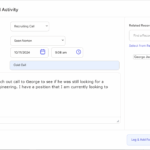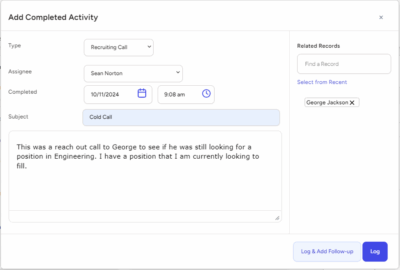In the realm of agency recruiting and search consulting, technical skills and industry knowledge are essential. However, one often-overlooked element that plays a critical role in building effective recruiting relationships is emotional intelligence (EI).
Emotional intelligence, which encompasses the ability to recognize, understand, manage, and influence emotions, is fundamental in fostering strong, trust-based relationships with clients, candidates, and colleagues. This article from Top Echelon Recruiting Software explores the importance of emotional intelligence in recruiting, its components, and practical strategies for enhancing EI to build more effective relationships.
Understanding Emotional Intelligence
What is Emotional Intelligence?
Emotional intelligence refers to the ability to perceive, control, and evaluate emotions in oneself and others. According to psychologist Daniel Goleman, who popularized the concept, EI consists of five key components:
- Self-Awareness: Recognizing and understanding one’s own emotions.
- Self-Regulation: Managing one’s emotions in healthy ways.
- Motivation: Harnessing emotions to pursue goals with energy and persistence.
- Empathy: Understanding the emotions of others and responding appropriately.
- Social Skills: Managing relationships to move people in desired directions.
Why Emotional Intelligence Matters in Recruiting
- Building Trust: Trust is the cornerstone of effective recruiting relationships. Emotional intelligence enables recruiters to build trust through empathy, active listening, and genuine engagement.
- Enhanced Communication: Effective communication, both verbal and non-verbal, is crucial in recruitment. EI helps recruiters convey messages clearly, interpret non-verbal cues, and respond appropriately.
- Conflict Resolution: Conflicts are inevitable in any professional setting. Emotional intelligence equips recruiters with the skills to manage and resolve conflicts amicably.
- Improved Candidate Experience: Candidates are more likely to have a positive experience when they feel understood and valued. EI helps recruiters create a supportive and engaging candidate journey.
- Stronger Client Relationships: Clients appreciate recruiters who can understand their needs, manage expectations, and build rapport. EI enhances a recruiter’s ability to connect with clients on a deeper level.
Components of Emotional Intelligence in Recruiting
1. Self-Awareness
Self-awareness involves recognizing one’s own emotions and their impact on thoughts and behavior. For recruiters, self-awareness is the first step toward effective emotional management and relationship building.
Tips for Enhancing Self-Awareness
- Reflection: Regularly reflect on your emotions and how they influence your interactions with clients and candidates.
- Feedback: Seek feedback from colleagues and mentors to gain insights into your emotional responses and areas for improvement.
- Mindfulness: Practice mindfulness techniques, such as meditation and deep breathing, to stay present and aware of your emotions.
2. Self-Regulation
Self-regulation is the ability to control or redirect disruptive emotions and impulses. In recruiting, this means staying calm under pressure, managing stress, and avoiding reactive behaviors.
Tips for Enhancing Self-Regulation
- Pause and Reflect: Take a moment to pause and reflect before responding to challenging situations. This helps in avoiding impulsive reactions.
- Stress Management: Develop healthy coping mechanisms for stress, such as exercise, hobbies, and relaxation techniques.
- Stay Flexible: Be open to change and adaptable in your approach. Flexibility helps in managing unexpected challenges effectively.
3. Motivation
Motivation involves harnessing emotions to pursue goals with passion and perseverance. Motivated recruiters are more likely to inspire confidence in clients and candidates.
Tips for Enhancing Motivation
- Set Goals: Establish clear, achievable goals for your recruitment activities. Goals provide direction and purpose.
- Stay Positive: Maintain a positive attitude, even in the face of setbacks. Positivity is contagious and can motivate those around you.
- Continuous Learning: Invest in continuous learning and professional development to stay motivated and enhance your skills.
4. Empathy
Empathy is the ability to understand and share the feelings of others. In recruiting, empathy helps in understanding the needs, concerns, and aspirations of clients and candidates.
Tips for Enhancing Empathy
- Active Listening: Practice active listening by fully focusing on the speaker, acknowledging their points, and responding thoughtfully.
- Ask Questions: Ask open-ended questions to gain deeper insights into the emotions and experiences of clients and candidates.
- Perspective-Taking: Try to see situations from the perspective of others. This helps in understanding their emotions and responding appropriately.
5. Social Skills
Social skills involve managing relationships effectively to move people in desired directions. For recruiters, strong social skills are essential for networking, influencing decisions, and building rapport.
Tips for Enhancing Social Skills
- Build Rapport: Take the time to build rapport with clients and candidates. Small gestures, such as remembering names and personal details, can make a big difference.
- Conflict Resolution: Develop conflict resolution skills to address and resolve disputes amicably. This includes staying calm, listening actively, and finding common ground.
- Networking: Expand your professional network by attending industry events, joining professional groups, and engaging on social media platforms.
Practical Applications of Emotional Intelligence in Recruiting
Building Trust with Clients
Building trust with clients is fundamental to successful recruiting. Emotional intelligence enables recruiters to understand client needs, manage expectations, and build lasting relationships.
Strategies for Building Client Trust
- Understand Client Needs: Use empathy to understand the unique needs and challenges of each client. This helps in providing tailored solutions that meet their specific requirements.
- Manage Expectations: Use self-awareness and self-regulation to manage client expectations effectively. Be honest about what is achievable and avoid overpromising.
- Communicate Effectively: Use clear and transparent communication to keep clients informed about the progress of their recruitment efforts. Regular updates and feedback build confidence and trust.
Enhancing the Candidate Experience
A positive candidate experience is crucial for attracting and retaining top talent. Emotional intelligence helps recruiters create an engaging and supportive candidate journey.
Strategies for Enhancing Candidate Experience
- Empathetic Engagement: Engage with candidates empathetically by understanding their career aspirations, concerns, and motivations. Show genuine interest in their success.
- Clear Communication: Communicate clearly and transparently with candidates about the recruitment process, timelines, and expectations. Avoid leaving candidates in the dark.
- Constructive Feedback: Provide constructive feedback to candidates after interviews and assessments. This helps them improve and demonstrates your commitment to their development.
Managing and Resolving Conflicts
Conflicts are inevitable in any professional setting. Emotional intelligence equips recruiters with the skills to manage and resolve conflicts effectively.
Strategies for Managing Conflicts
- Stay Calm: Use self-regulation to stay calm and composed during conflicts. Avoid reacting impulsively and take the time to understand the situation.
- Active Listening: Practice active listening to understand the perspectives of all parties involved in the conflict. This helps in identifying the root cause and finding a resolution.
- Seek Solutions: Focus on finding mutually beneficial solutions rather than assigning blame. Use empathy and social skills to facilitate a collaborative approach to conflict resolution.
Networking and Building Professional Relationships
Networking is essential for expanding your professional reach and building valuable connections. Emotional intelligence enhances your ability to network effectively and build lasting relationships.
Strategies for Effective Networking
- Be Genuine: Use self-awareness and empathy to build genuine connections with others. Authenticity is key to building trust and rapport.
- Follow-Up: Follow up with new contacts after networking events to reinforce the connection. Send personalized messages to show your appreciation for their time.
- Offer Value: Offer value to your network by sharing industry insights, job opportunities, and professional advice. This helps in building a mutually beneficial relationship.
Case Studies: Emotional Intelligence in Action
Case Study 1: Building Client Trust
Scenario: A recruitment agency was struggling to meet the expectations of a key client. The client was frustrated with the lack of suitable candidates and was considering ending the partnership.
Strategy:
- The agency’s lead recruiter used emotional intelligence to understand the client’s frustrations and concerns. They scheduled a meeting to discuss the issues openly.
- Using empathy and active listening, the recruiter acknowledged the client’s challenges and explained the market conditions that were impacting candidate availability.
- The recruiter used self-regulation to remain calm and composed, even when the client expressed dissatisfaction.
- They developed a tailored recruitment strategy that aligned with the client’s specific needs and provided regular updates to manage expectations.
Outcome: The client appreciated the recruiter’s honesty and proactive approach. Trust was rebuilt, and the partnership continued with improved results and satisfaction.
Case Study 2: Enhancing Candidate Experience
Scenario: A candidate for a senior executive role expressed frustration with the lengthy recruitment process and lack of communication from the agency.
Strategy:
- The recruiter used self-awareness to recognize the candidate’s frustration and empathized with their concerns.
- They scheduled a call to address the candidate’s concerns directly, using active listening to understand their perspective fully.
- The recruiter used clear communication to explain the reasons for the delays and provided a revised timeline for the recruitment process.
- They committed to regular updates and provided constructive feedback after each stage of the process.
Outcome: The candidate felt heard and valued, which improved their overall experience. They remained engaged in the process and ultimately accepted the job offer. The positive experience also led to referrals of other high-quality candidates.
Case Study 3: Managing Team Conflicts
Scenario: A recruitment team faced internal conflicts due to differing opinions on candidate selection strategies. The tension was affecting team morale and productivity.
Strategy:
- The team leader used self-regulation to remain neutral and composed while addressing the conflict.
- They facilitated a team meeting to discuss the issues openly, using active listening to understand each team member’s perspective.
- The leader used empathy to acknowledge the emotions and concerns of each team member.
- They encouraged a collaborative approach to find common ground and develop a unified strategy for candidate selection.
Outcome: The team was able to resolve their differences and develop a cohesive strategy that everyone supported. Team morale and productivity improved, leading to better recruitment outcomes.
Enhancing Emotional Intelligence in Your Team
Training and Development
Investing in emotional intelligence training and development for your team can significantly enhance their ability to build effective relationships.
Tips for EI Training
- Workshops and Seminars: Conduct workshops and seminars focused on emotional intelligence skills, such as empathy, active listening, and conflict resolution.
- Online Courses: Encourage team members to enroll in online courses that offer training in emotional intelligence.
- Role-Playing Exercises: Use role-playing exercises to simulate real-life scenarios and practice EI skills in a safe environment.
Promoting a Culture of Emotional Intelligence
Creating a culture that values and promotes emotional intelligence can lead to a more supportive and collaborative work environment.
Tips for Promoting EI Culture
- Lead by Example: Model emotionally intelligent behavior in your interactions with clients, candidates, and team members.
- Encourage Feedback: Foster an environment where feedback is encouraged and valued. Use feedback to identify areas for improvement and celebrate successes.
- Recognize EI Skills: Recognize and reward team members who demonstrate strong emotional intelligence skills in their work.
Emotional Intelligence: A Powerful Tool
Emotional intelligence is a powerful tool for building effective recruiting relationships. By enhancing self-awareness, self-regulation, motivation, empathy, and social skills, recruiters can build trust, communicate effectively, manage conflicts, and create positive experiences for clients and candidates.
Investing in the development of emotional intelligence within your team can lead to stronger, more resilient relationships, driving long-term success in the competitive world of agency recruiting and search consulting. By embracing emotional intelligence, recruiters can elevate their practice, delivering exceptional value and forging lasting partnerships.








